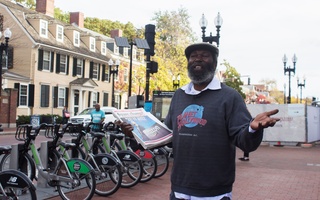For more than a decade, passersby in Harvard Square have been greeted by a familiar booming voice in front of Au Bon Pain imploring them to “have a heart.”
Some people shuffle by, staring at their feet, while others shell out a dollar, convinced by the signature catchphrases of Gregory H. Daugherty, a Boston native who stands outside the crowded coffee shop selling Spare Change newspapers in almost any weather.
Daugherty, who lives in a homeless shelter in Quincy, Mass., attributes his marketing skills to his father and friends, but adds that his own outgoing nature comes in handy as a salesman.
“I love to sell,” he says. “God was good to me. I never trained myself how to deal with the public.”
Daughtery has become a Square fixture with his effusive interactions with passersby, even making a cameo appearance in Good Will Hunting. He says many people ignore him, and others simply pay for their newspapers without a word. But a few, he says, stop to talk with him.
“I get a lot of love out there,” he says.
PROMOTING INDEPENDENCE
Daughtery is one of about 120 vendors who sell Spare Change newspapers produced by the Homeless Empowerment Project (HEP), a Cambridge-based organization that aims to provide opportunities for homeless people to earn their own income and enhance their business skills.
The newspaper, begun by a group of homeless people in 1992, covers a wide range of material, from homeless-related news to movie reviews, poetry, and editorials. Writers come from all walks of life. Some, who are not homeless, volunteer their efforts, while homeless writers receive a stipend of about $50 per article, according to Samuel Weems, one of two overseers of Spare Change distribution.
The non-profit HEP was founded in 1994 to support the production of Spare Change. The newspaper publishes about 10,000 copies of each of its biweekly issues, and all profits go directly toward funding the production of future issues, Weems says.
Weems explains that the organization hopes to foster in its vendors a sense of financial independence without getting deeply involved in their personal lives.
Vendors buy the papers from the office for 25 cents, then sell them on the streets for $1. Weems says some vendors are able to make $600 to $700 a week.
“They don’t work for Spare Change, they work for themselves,” Weems says. “They’re self-employed. They’re empowering themselves.”
Since the organization is flexible, Weems says, the number of vendors varies each day. Although there are about 120 individuals on Spare Change’s list, on average only about 80 buy papers from the office each week.
Weems also explains that not all of the vendors are homeless. Some used to be homeless, and some are simply low-income and looking for a way to pay their rent.
Read more in News
Harvard Acceptance Rate Hits Record LowRecommended Articles
-
Homeless Magazine Improves OperationsDown on his luck and out of work, Marc D. Goldfinger, a homeless heroin addict who by his own admission
-
Booking the Real ThingKaavya Viswanathan ’08 wrote a book last year. It is a pretty good book; it is thick, orange, and intended
-
Lending a HandLast night, students lined the streets of Cambridge cheering with unalloyed joy for Senator Barack Obama’s presidential victory. Outside with
-
 Students to Step Into Shoes of Homeless Newspaper Vendors
Students to Step Into Shoes of Homeless Newspaper Vendors -
 A Voice in the Square: Spare Change News
A Voice in the Square: Spare Change News













